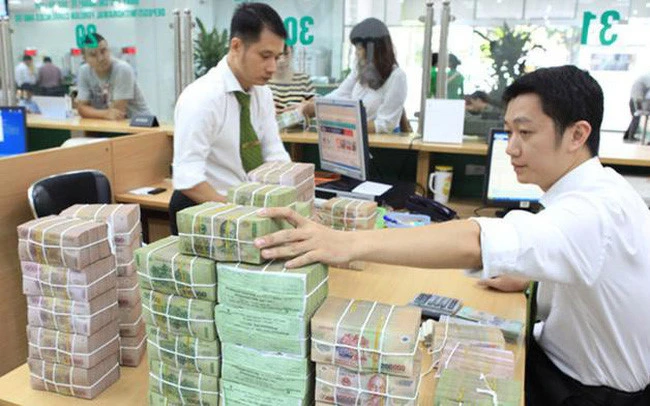
Negative impact of Covid-19
In the first week of February, many banks such as SHB, Sacombank, Techcombank, and MSB reduced deposit rates by 0.1% to 0.4% per annum. The fact that banks did not launch attractive preferential policies soon after the Tet Lunar New Year to attract money back, such as reducing deposit rates, was against the trend that we have often seen in previous years.
A report by Bao Viet Securities Joint Stock Company (BVSC) at the end of February stated that the twelve-month deposit interest rate of banks would decrease slightly. Specifically, interest rates of group of four commercial banks with state capital decreased by an average of 0.1%; group of commercial banks with capital of more than VND 5,000 bn decreased by 0.07%; and group of commercial banks with capital of less than VND 5,000 bn decreased by 0.01%.
According to BVSC, the cause of lower interest rate was due to the negative impact of the Covid-19 pandemic that led to more than 16,000 enterprises to suspend business for an indefinite period. Due to decline in business activities and consumer demand, the demand for loans and credit decreased, lowering the demand for deposits in banks in February.
As of 20 February, capital mobilization increased by 14.15% compared to the same period in 2019. Abundant liquidity in banks showed the relative rapid decline of interbank interest rates. At the end of February, the interest rate for one-week term and overnight term were at 2.02% per year and 2.42% per year, respectively. While at the end of January, these rates were 3.2% per year and 3.3% per year, respectively.
Since the beginning of February, the State Bank of Vietnam (SBV) has continuously net withdrawn money through the open market. Abundant input, difficult output continued to drag down interest rates of banks in March. Specifically, after SBV lowered the ceiling interest rate for terms less than six months, banks also actively reduced some terms that were for over six months.
Cannot lend out
According to Dr. Nguyen Tri Hieu, a financial expert, the Covid-19 pandemic crisis situation is making operations very difficult for all businesses, and the stock market is currently wobbly, while the real estate market is no longer favorable for investors. The dollar has appreciated in the world market, but foreign currency investment is having difficulty in making profit because the SBV is determined to keep the exchange rate stable.
However, the gold market is quite safe in these times of fluctuation in the global economy, although the current world gold price is falling. The reason is that the stock market dropped sharply, and many investors lost money and had to sell gold to cover for losses. At the same time, many investors also sold gold for cash, and then even withdrew cash from bank deposits.
In Vietnam, the VN Index has dropped sharply, showing that many investors have withdrawn capital. Currently, businesses are suffering and keeping cash for day to day functioning. Dr. Bui Quang Tin, CEO of BizLight Business School, said that although the State Bank has lowered the ceiling interest rate for less than six-month term period and commercial banks have also adjusted the interest rate for terms of more than six months, investing and saving will still be the most effective channels. Although many investors are waiting for an upward swing in the stock market, pouring money into stocks now has great risk. For real estate investment, liquidity is currently very poor, while loan interest rates have not yet decreased.
In many other commodity and investment markets, more than 70% of enterprises are operating hesitantly, by holding on to the hope that this pandemic will pass soon enough. Meanwhile, for the savings channel if the interest rate is higher than the expected inflation rate of 4%, it will still create certain benefits for people. For example, if the average interest rate of six months or more is about 7% to 8% per year and discounting for 4% inflation, people will still have about 3% to 4%. As for the policy of lowering deposit interest rates from one month to less than six months, if people have a term of less than six months, they still have a certain profit and can maintain liquidity to wait for other investment channels to flourish. Therefore, many people still consider this to be the most effective investment channel during the pandemic.
Striving to mobilize capital is a common operation of banks in recent years. But at this time, when deposits were the favored channel, pushing massive capital into banks has become a headache for banks, because banks cannot refuse to raise capital even though they cannot lend out. Facing the situation that banks were in excess of capital, SBV had to support. Specifically, when SBV decided to decrease all operating rates, the State Bank increased interest rates for compulsory reserves from 0.8% per year to 1% per year.
According to Dr. Nguyen Tri Hieu, this is a very interesting movement. The State Bank increased the compulsory reserve interest rate so that banks could enjoy higher interest rates, meaning that the banking system now has very good liquidity, but this is only good at this time. If the banks prolong they will face disadvantages, because they have to pay high interest rates but cannot lend out.
If the Covid-19 pandemic situation continues to persist for a longer duration, the burden on banks will be heavy. In fact, some banks are already foreseeing difficulties, and are reflecting on unexpected and sharp reduction in profits from what they have achieved over previous years.




















